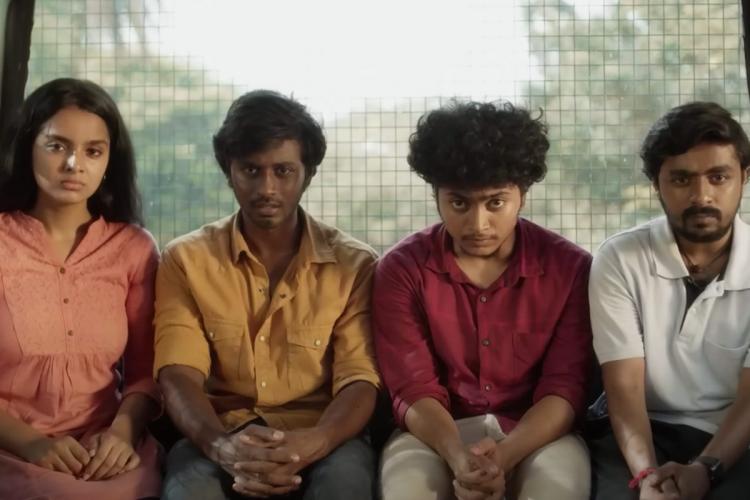Jubilee (Season 1, Part I) ‘Prime Video’ Review: The idea of filmmakers eying a pastiche to evoke the zeitgeist of an era is nothing new. After all, the celebration of mainstream pop culture, to a large extent, now amounts to resorting to a sustained longing for the old methods of storytelling. But in doing so, a lot of filmmakers run into the temptation of making nostalgia the sole guiding principle of their work rather than turning it into a functional element of it.
Vikramaditya Motwane remains one of the more versatile storytellers of the Hindi film industry today. He not only shares a deep fascination with film history but also often echoes the cultural currents that seep into the medium in his works. His latest is a 10-part series, aptly called “Jubilee,” which he directed as well as co-created with Soumik Sen. Gladly, the show doesn’t succumb to the hijinks of nostalgia porn that often masquerades under amber color palettes. But it doesn’t mean the show doesn’t have issues of its own.
The setting is the India of the 40s and 50s, nascent to the sociopolitical as well as commercial sensibilities of the turbulent times. Concurrently, there’s the rise of the Hindi film industry making its own space in the rich cultural landscape of a nation precariously seeking out means of entertainment.
There’s the most prominent movie studio in India, Roy Talkies, headed by a ruthless visionary, Srikant Roy (Prosenjit Chatterjee), for whom cinema is equivalent to power and business. His ‘business’ partner is Sumitra Kumari (Aditi Rao Hydari), a woman who also happens to be a successful movie star.
Together, they’re in search of a new lead hero, whom they’ve already named Madan Kumar. The reverse-engineered name bears a political significance, making the big studio one of the few players to foresee the communal divide the nation was in even before it all could be geographically laid out.
However, unlike how they had foreseen, the role falls to the loyal lab assistant and future superstar named Binod Das (Aparshakti Khurana). His rise to stardom doesn’t sit particularly well with a key, street-smart financier called Shamsher Walia (an excellently cast Ram Kapoor) and his home-maker wife, Ratna Das (Shweta Basu Prasad).
While the former gives an insight into a nascent industry already corrupted by hedonistic desires, the latter informs the moral corruption that so often breaks the semblance of stardom. It’s the contrast that forms the thematic heartbeat of “Jubilee” – the curious dichotomy between the perceiver and the perceived.
The same is also echoed in the character of a scrappy courtesan – a stunningly charismatic Niloufer Qureshi (Wamiqa Habbi). Watching her, you can’t help but feel how she deserves better as you watch her climb the newcomer-actress chain.
‘‘Star ho, actor banne ki koshish mat karo”, Srikant advises Binod, aka Madan Kumar, at a point when the newly made star shows the desire to sing films outside the studio banner that launched him.
The scene plays in contrast to an earlier dialogue from the first episode, where Binod tells his wife how it’s best advisable for actors and creators to stay silent and fall in line to be able to thrive in the industry. Somewhere along his journey, Binod seems to have forgotten the very foundations that got him into the business. What is fame, after all, if not a dialect of pretense?
The standout in the ensemble of actors, however, remains Jay Khanna (a breakout performance by Sidhant Gupta). His character arc runs in parallel to the dilemma the whole nation finds itself to be in a head-on collision with: does he maintain the prestigious acclamation his prosperous background entails or settle for the commercialization of his talent?
From being the scion of a theater owner in Karachi, Jay becomes a poor refugee in India looking for a job to support his family. Of course, his path intertwines with that of Binod as the story reinforces the stark contrast between the two.
One goes from being a lab technician carrying out the studio owner’s dirty linen to becoming a superstar, while the other struggles at fulfilling his own aspirations. It all makes for fascinating conceit on paper, but “Jubilee” never elevates itself above these stark contrasts.
The biggest setback of the show remains in how inconsequential it remains to the actions of its characters, only for them to later pick upon their motivations. By the time the central mystery involving a missing person is brought up again, the audience is served with half-baked subplots involving Soviet and American influences over the studio’s functioning.
Plot conveniences resurface faster than character consequences, and the rationales start feeling less consequential with each episode. This also explains why the first two episodes remain the strongest, which show shades of a more promising storyteller Motwane has proven himself to be.
In fact, the first episode deliberately lures you into its moody and sweeping visuals of the pre-independence era. In contrast, the second throws you off guard into the more sinister undercurrents and challenges the political status quo in the two newly born countries of the time imposed.
It all remains technically impressive (“Jubilee” is Prime Video’s most expensive Indian production to date), but it keeps you at arm’s length from the film industry world that the makers so desperately want you to believe they’ve got it all right.
One of the most essential factors that go into making a period drama is to expand upon the tone of your overarching narrative consistently. The first few episodes of “Jubilee” capture the heightened reality that the Indian cinematic landscape of the time functioned at. But the show doesn’t fully commit to that tone, nor does it explain or remotely hint at how things had functioned before the rise of the myth of Madan Kumar.
The typecasting of Aditi Rao Hydari as the ultimate damsel in distress doesn’t only water down the mystery of the character but also robs her of any form of palpable agency. It all makes for a fascinating double-barreled tale. There are plenty of real-life personalities, including Ashok Kumar and Raj Kapoor, that we see reminiscences of – particularly the strong resemblance of Srikant and Sumitra to Himanshu Rai and Devika Rani.
But “Jubilee” never quite lands in the same artistic plane as the objects that Motwane and the team truly feel reverence toward. Underneath its pristine production value, the show relishes itself with hijinks of the conventional tropes but in doing so, strangely turns inert to them.
The first five episodes left me reminiscing about the heart-tugging string of musical choices more than the ghost that haunts Madan Kumar. Or should I say the myth of Madan Kumar? Alas, we would never be able to tell them apart.






